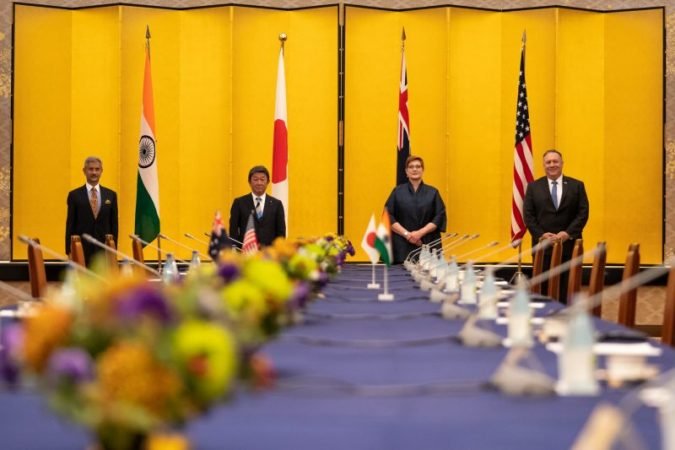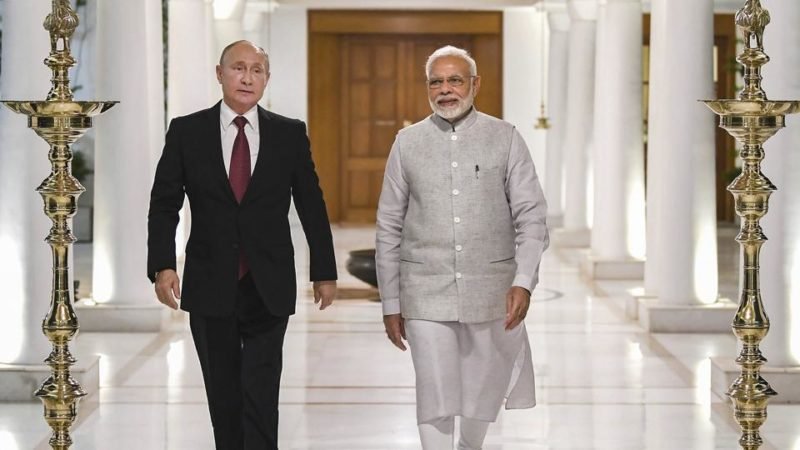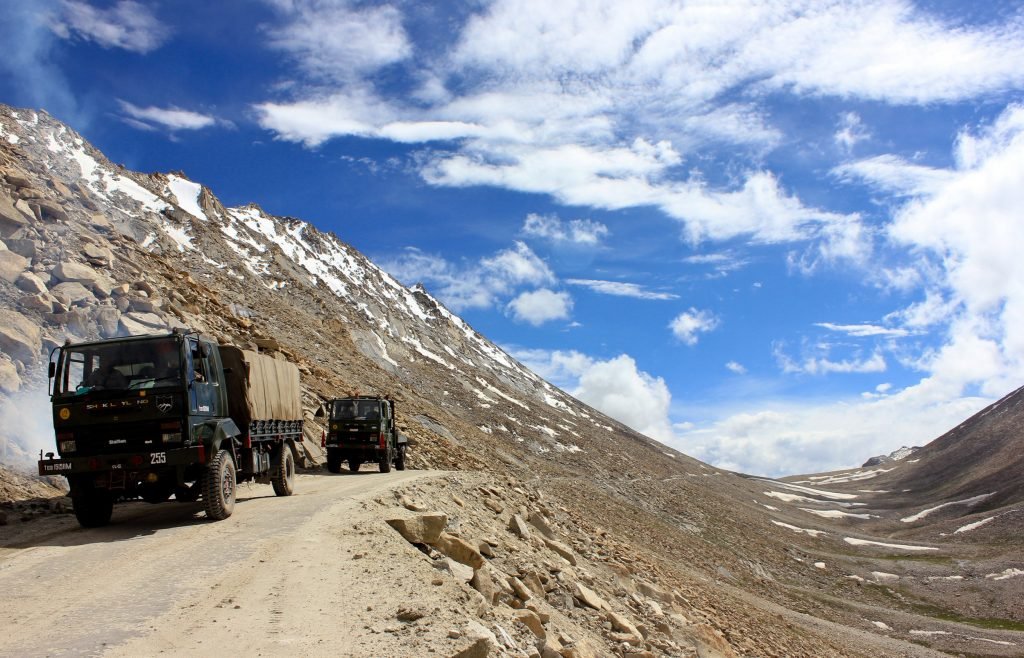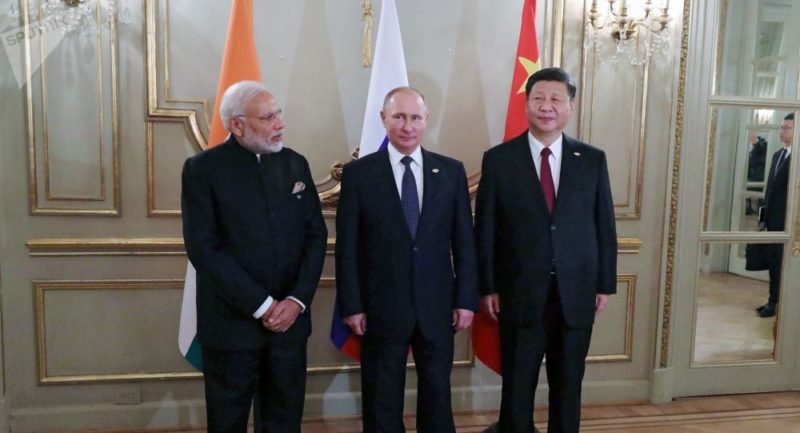For long-term benefit, India must join democratic countries

In 2020, the most difficult year of India’s post-independent history, Russia has time and again slammed the concept of Indo-Pacific and India’s joining the Quadrilateral Security Dialogue shortly called Quad. As per Kremlin, the Quad is nothing less than the US’s attempt to divide the world and to contain China as if Quad member nations are lead by immature and inexperienced diplomacies.
It is true that the Quad or Indo-Pacific framework is exclusively to contain China’s recent belligerence; not against China’s economic growth and prosperity as alleged. And, it is not without reasons. But, Russia, with which India has ‘Declaration on the India-Russia Strategic Partnership’ signed in 2000 and the same has been upgraded to ‘Special and Privileged Strategic Partnership’ decade later in 2010 and from which India imports in some years more than 70% of her war gears, naming India and accusing her being party to ‘anti-China policies by aligning with the Western Power’ through her Foreign Affairs Minister Sergey Lavrov is certainly uncalled for and disturbing.

“This is not the opportune time for Russia to keep stating the same thing, again and again, knowing all too well that the China threat is staring at India,” Kanwal Sibal, Indian’s Ambassador to Moscow from 2004-07 opined and going further, he added, “But wittingly or unwittingly, the Russians are overlooking the threat.”
What is cooking between two north Asian neighbours the White Bear and Dragon, who are the world’s second and third-largest military powers (both conventional and nuclear arms put together)? And that too while one is being ruled by an elected autocrat, the other one is being ruled by autocratic communist, and both the countries’ supreme leaders have got their candidatures specific constitutional amendments to rule for life? Has Russia for time being -to satisfy its supreme leader’s power hunger- forgotten Chinese ambition to occupy Eastern Russia including Vladivostok, Russia’s gateway to the vast Pacific Ocean, for which the erstwhile Soviet Union fought a bloody war with PLA in 1969, and time and again raise this issue, and Chinese debt-burdened influential Silkroad Diplomacy in resource-rich Central Asian countries or otherwise called Commonwealth of Independent States (CIS), in the very backyard of Russia, which is as per many strategic thinkers is a potential future threat to Russia’s strategic, economic and political interests?
Russian leadership should not forget that Indo-Pacific has been prioritized by India as well as other Quad member nations other than the US –however with extreme restraint ignoring external and internal pressures- mostly due to China’s present leadership’s unjust and illegal aggression in the region apart from their apparent non-cooperation and deliberately hiding of the facts related to the origin and spread of dreaded pandemic Covid19 which killed so far more than one million people and infected 50 million, and almost crippled world economy as well as pushing billion of the population to abject poverty and malnutrition worldwide. Among other mind-bungling issues are: for the last half-decade, China has been virtually occupant of resource (Mineral and Fishing) rich the South China Sea and the East China Sea, through which world’s 30% sea-borne trade passes through, and sabre-rattle these two seas’ all littoral nations ignoring time-tested UNCLOS and the ruling of International Court of Arbitration in favour of island nation Philippines.

Besides Chinese encroachment of SCS and ECS picking up some sentence from history books, PLA has incursed into the buffer zone in India’s Union Territory ie Ladakh that separates India and China’s 1950-occupied-Tibet in 2020 during harsh winter break in the inhospitable Himalayas. As per latest news being made available from Nepal and Bhutan sources, PLA has in the meanwhile diverted rivers in the border in Nepal and has been building villages in both these countries allegedly encroaching their territories. Here, it needs to be mentioned that while Nepal takes care of her national security, India is in charge of Bhutan security. And PLA’s recent positioning on Bhutanese border overlooks India’s strategically significant chicken neck geography that connects India’s mainland with North-Eastern states.
Now, as per satellite imageries available from different credible sources, it is understood that China is building dams in the upstream of the major rivers such as The Brahmaputra and Mekong without taking into the confidence of downstream beneficiaries such as India and Bangladesh in case of former and Myanmar, Thailand, Laos, Cambodia and Vietnam in case of latter, forget about informing them who will be losing their share of water that they need for their survival and agriculture-industry, and other economic benefits from the uninterrupted flow of river waters. Besides, these two rivers are potential threats to population downstream as the large dams on them are being built in earthquake-prone regions.
China wishes to be a world power. Fine and no problem! With the world, power comes world-class responsibilities that China’s leadership should not forget. This is the writing on the wall, one cannot just overlook. But, instead, it is noticed that China has conveniently forgotten its world-class responsibilities in pursuit of enforcing autocratic communist rule not only in China but also in her forcefully occupied territories and nation’s neighbourhood which are not at all acceptable to the civilized world.
Russia should not forget that India, as the largest democracy in the world, second-largest economy and one of the most populous nations in the region, has some responsibilities not only towards her own country but also countries in the region as latter look for support and guidance from former in major issues concerning to governance to security to disaster management to development support, and there is civilizational links among themselves. And the Quad dialogue started taking concrete shape only after China provoked a dispute with Japan over Senkaku isles, after PLA transgression in East Ladakh sector, after imposing trade sanctions on Australia coal, cattle products, barley, etc. and after testing N-missiles during the US naval exercises in SCS.
Since both Indian and China started being ruled by their present form of government in the late 1940s, they fought one major war and several small wars and bloody skirmishes. The border between the two Asian military giants has not been allowed to be properly demarcated since China has brutally occupied Tibet which was actually the buffer between them from time immemorial.

Should China be allowed to indulge in what it is doing now? This is the question that Russia needs to answer before alleging India for being part of Quad and alleges ‘anti-China policies’ though India time and again have clarified that her alliances with friendly countries are not against any others, ‘but certainly for self-defence’.
Post-independence, India has consciously chosen democratic system of governance unlike China, where communism has been imposed, and after long deliberation for more than 40 years, India endorsed liberalization and globalization of her economy which have greatly benefited to nation’s economic growth and poverty eradication. In these two areas (political and economy), India has synergy with the US and the West. And both have contributed to India’s defence during the Chinese imposed 1962 War and Pakistan imposed the Kargil War. In 1965 and 1971 Indo-Pak wars, except The White House, the entire West was with India. But, in Russia and in China, the situations are such, leadership and the public can’t have different views. Apart from the above, most of the investable capitals and modern technologies -needed for modern economic development- have been generated in democratic nations. In view of the above facts, India’s present diplomacy of promoting the Quad and joining the West, some of these countries are found highly proactive post-Galwan skirmish, on the face of criticisms is advisable.



















